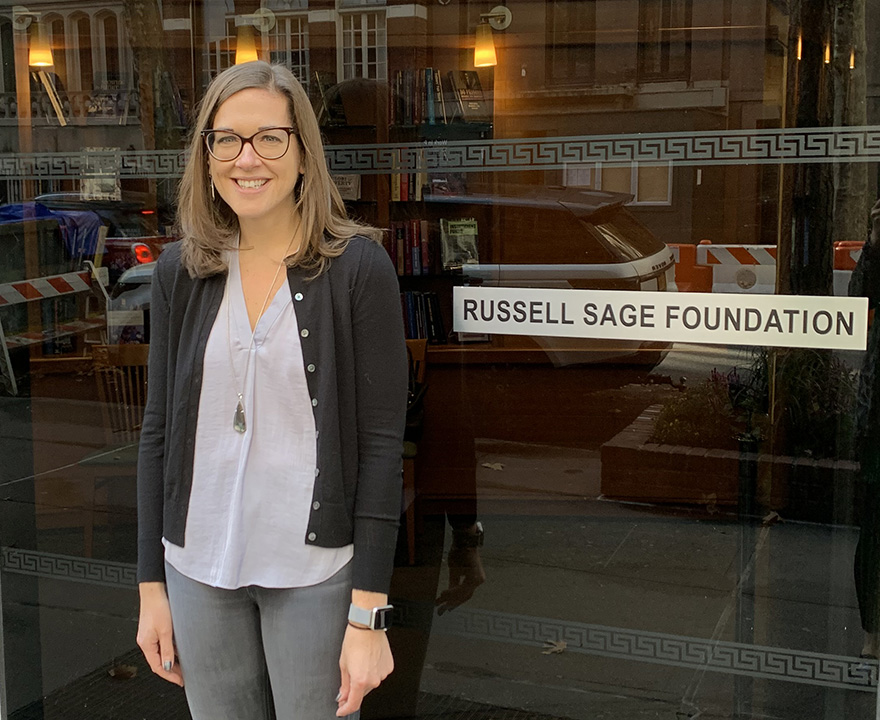Generational effects of incarceration

Generational effects of incarceration
- November 14, 2019
- UCI sociologist Kristin Turney earns Russell Sage Foundation fellowship to study the long-term consequences of parental incarceration on the children and partners left behind
-----
Conditions out of a person’s control can have a tremendously negative impact on health, behavior, and later life outcomes. UCI sociologist Kristin Turney knows this to be true; her work takes an intergenerational look at heavy topics like long-term consequences of foster care and incarceration. With a newly awarded fellowship from the Russell Sage Foundation, she’s diving deeply into the latter with a study on parental incarceration - particularly incarceration of a father - and the often overlooked disadvantages it causes for partner and children relationships, health and overall wellbeing.
“A lot of research has shown the detrimental consequences parental incarceration creates not only for the person serving time, but for everyone left behind - the families,” she says. “I’m really interested in digging into the data to find for which families paternal incarceration is most consequential.”
Research in this area by Turney and others has found that involuntary removal of a father creates an enormous amount of stress that disrupts romantic partner relationships, impairs the remaining parental figure’s availability to spend time with children, and impedes the family’s economic stability - thereby increasing the risks of poverty and negative mental health outcomes. The repercussions of any one of these consequences can be felt generations deep by the children who grow up with a parent who has served time. Learning disabilities, ADHD, behavioral and conduct problems, developmental delays, and speech and language problems are all very real outcomes children face when their pathways intertwine with parental incarceration. And that’s an issue that touches more than 2.6 million U.S. children who have a parent in jail or prison at any given time – a majority of whom are already considered an at risk population.
“Incarceration is disproportionately concentrated among already disadvantaged groups including racial and ethnic minorities, the impoverished, and those with lower levels of education,” she says. “Given its unequal distribution across the U.S. population, incarceration exacerbates racial and social class inequalities that negatively impact partner and child wellbeing.”
For the next year, she’s in-residence at the Russell Sage Foundation headquarters in New York working on a book project detailing the short- and long-term consequences of incarceration on family life and how race, education, and residential status factor into the equation. She’ll be using the Fragile Families and Child Wellbeing Study that tracked about 5,000 children born to mostly unmarried parents in 20 large cities in 1998-99, with follow up interviews conducted with the parents when their children were ages 1, 3, 5, 9 and 15.
“Research shows that more than one-third of children born in urban areas experience paternal incarceration by age 9, so this survey gives us great insight into life factors experienced before, during and after incarceration,” she says.
Through research, she hopes to discover which families are most negatively affected when a father is incarcerated so that policies can be better targeted to aid those in need.
-Heather Ashbach, UCI Social Sciences
About the UCI’s Brilliant Future Campaign: Publicly launched on October 4, 2019, the Brilliant Future campaign aims to raise awareness and support for UCI. By engaging 75,000 alumni and garnering $2 billion in philanthropic investment, UCI seeks to reach new heights of excellence in student success, health and wellness, research and more. The UCI School of Social Sciences plays a vital role in the success of the campaign. Learn more by visiting giving.socsci.uci.edu.
-----
Would you like to get more involved with the social sciences? Email us at communications@socsci.uci.edu to connect.
Share on:
Related News Items
- Careet RightUCI sociologists earn American Sociological Association honors, leadership roles
- Careet RightMultiple honors for UCI soc sci's Maricela Bañuelos
- Careet RightCalifornia's prison death rates rose amid COVID
- Careet RightCOVID prison death rate increased 3 times higher than broader population: study
- Careet RightHow the US failed people in prisons during Covid: 'Really important to learn from what happened'


